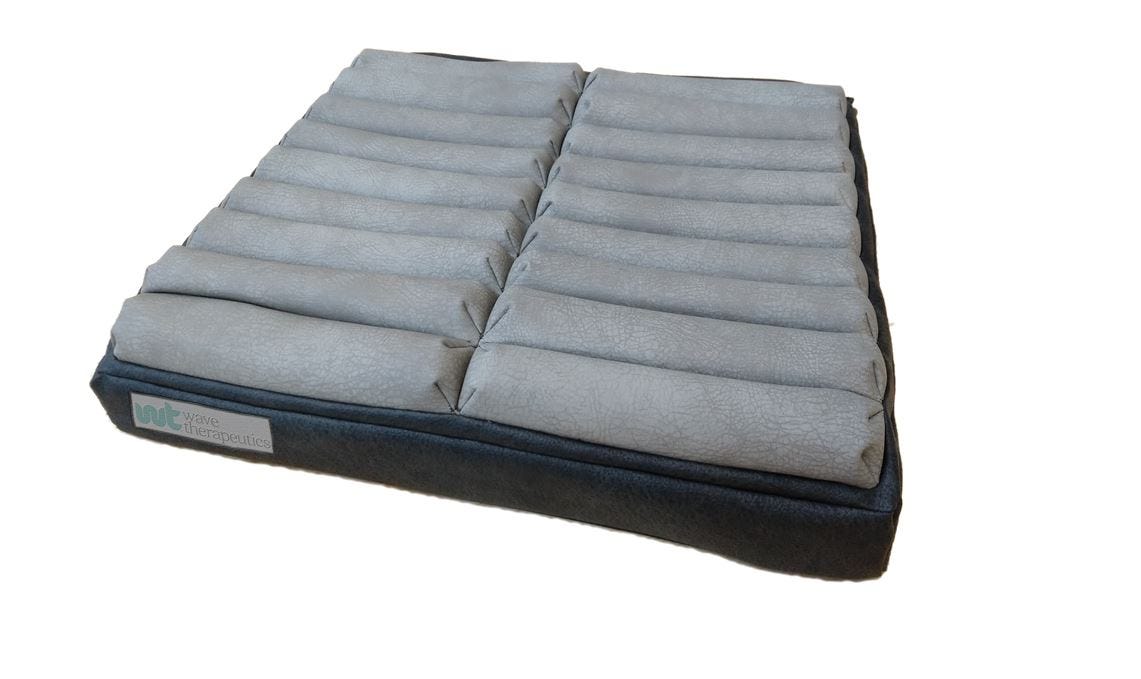Startup Battles Bedsores with Wheelchair Cushion
 Bussert says the cushion creates a rolling wave of low pressure to eliminate pressure hot spots and pushes the blood back toward the heart and lungs.
Bussert says the cushion creates a rolling wave of low pressure to eliminate pressure hot spots and pushes the blood back toward the heart and lungs.
Subscriber Benefit
As a subscriber you can listen to articles at work, in the car, or while you work out. Subscribe NowBedsores are crippling for both the patient and the healthcare system. The devastating wounds, also called pressure ulcers, are difficult to treat and can lead to life-threatening complications; about 60,000 patients die as a direct result of a pressure ulcer each year. Bedsores are also a crushing problem for medical facilities, costing about $10 billion each year in the U.S. A woman-owned startup in small-town southern Indiana is attacking the problem with a new wheelchair cushion to prevent bedsores and just inked a major contract with the Veterans Health Administration (VHA); the deal could be the final push to commercialize the device which—profoundly—was originally inspired by a veteran.
Jessica Bussert says, “I’ve thought about him, basically, every day,” when she recalls treating a wheelchair-bound veteran who arrived in the small-town emergency department where she was a nurse with “the worst bedsores I had ever seen in my life.” Not just surface wounds, bedsores damage underlying tissue and can become infected. The sores result from prolonged pressure on the skin that prevents blood flow, so people with limited mobility are most at risk.
“Most people who don’t have any experience with bedsores don’t realize what a crushing problem they are,” says Bussert, who is founder, president and chief executive officer of Nashville-based Wave Therapeutics. “If somebody develops a bedsore, their whole life changes that moment. If you’re a younger person—active, but in a wheelchair—your independence is instantly robbed from you, and you’re going to be in a hospital bed [for months] while that injury heals; it’s like being in solitary confinement. For an elderly person in a long-term care facility, you can’t even socialize with the other residents, because you’re dealing with this painful and horrific sore.”
The veteran Bussert treated years ago couldn’t afford the $4,000 wheelchair cushion his doctor prescribed, which Bussert estimates contained only $100 worth of parts. “It made me feel like someone was profiteering off of human suffering,” says Bussert. Her idea for a solution was born, and she soon left full-time nursing to develop the Wave Therapeutic Cushion for wheelchairs to reduce the risk of bedsores.
Bussert says the cushion creates a rolling wave of low pressure underneath the patient to eliminate pressure hot spots by “changing up” the pressure points that lead to bedsores. Bussert believes what differentiates the cushion from others on the market is the added feature of sequential compression, a pumping action that moves from behind the knees to the buttocks to draw blood flow back toward the heart and lungs.
“Blood doesn’t do any good for the body unless it’s oxygenated. [Other cushions] teeter totter blood from side to side, but there’s no way for blood to get reoxygenated going from side to side. By actually moving blood back toward the heart and lungs and completing the circuit, we’re able to help the heart do its job that much better,” says Bussert. “The technology is based upon the combination of alternating pressure and sequential compression, both clinically-proven therapies that have been extensively tested and validated. We’ve just mashed them together.”
The cushion recently captured the attention of the VHA Innovation Ecosystem. Wave Therapeutics has inked a contract with the organization to collaborate on continued research and development for the cushion and test it at the Louis Stokes Cleveland VA Medical Center.
“This is huge; I can’t overstate it. The VHA is the largest healthcare network in the U.S., so in effect, it’s my biggest potential customer,” says Bussert. “My biggest potential customer has said they believe in this product so much that they’re putting their own money on the table to study it and confirm our claims. In doing so, we become the preferred provider for this type of technology to the VHA.”
Wisconsin-based startup accelerator gener8tor also recently selected Wave Therapeutics to participate in its gBETA spring cohort. Bussert believes Wave Therapeutics is just weeks away from commercially launching the wheelchair cushion at a reimbursement rate of $450. The device is a Class 1 exempt product (deemed to be low-risk), which doesn’t require clinical studies, and Bussert says it will be manufactured in Indiana.
The framework technology has a long list of potential applications; Bussert says a mattress will be the startup’s second product and cost around $10,000, compared to current ones that are about $100,000.
“Most medical devices are brought to market by billion-dollar corporations. I’m the founder of a small company in southern Indiana, and we’re trying to take on this massively huge challenge,” says Bussert. “We’ve got a lot of audacity to try to do it ourselves, but we are, and we’re getting the job done.”
After a $500,000 pre-seed funding round in 2019, Bussert says the startup is now in the middle of a $2 million seed round.
Bussert says bedsores cost medical facilities “huge amounts of money” and are the second most common medical malpractice claim.
